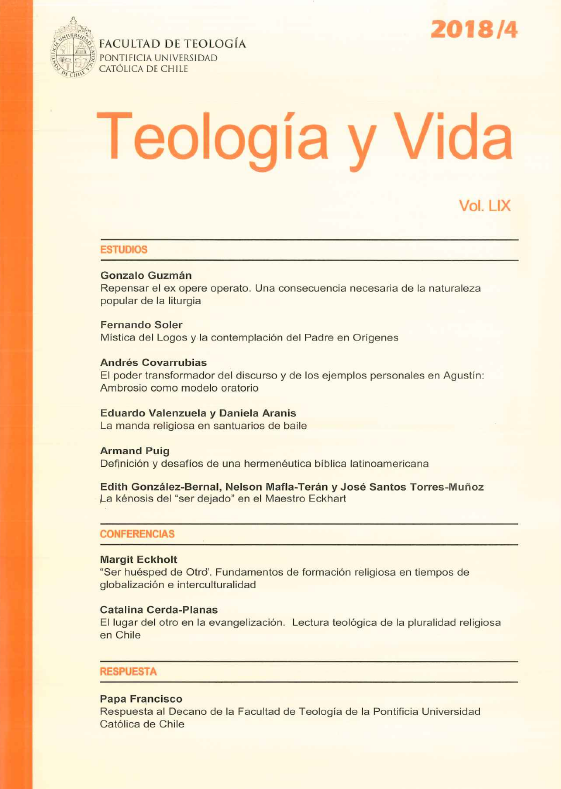El poder transformador del discurso y de los ejemplos personales en Agustín: Ambrosio como modelo oratorio
Contenido principal del artículo
Resumen
Resumen: San Agustín asume la retórica tradicional en términos de que el orador debe enseñar, deleitar y mover, pero la modifica al proponer que lo único necesario es lo primero. Esto en el contexto de que aunque las cosas dichas enseñen, deleiten y muevan menos, se ha de decir lo verdadero y justo, aunque no se logre el asentimiento del auditor. Una segunda diferencia es que para la retórica tradicional, las cosas pequeñas han de decirse con sencillez, las medianas con moderación y las grandes con grandilocuencia. En cambio, para el Obispo de Hipona, todo lo que predica el orador eclesiástico tiene grandeza, por estar vinculado a las Sagradas Escrituras. Este cambio de modelo solo es posible a partir del ejemplo de San Ambrosio.
Palabras clave: San Agustín, San Ambrosio, retórica, ejemplo.
Abstract: Saint Augustine assumes traditional rhetoric in terms that he must teach, delight and move, but he modifies it by proposing that to teach is the only necessary thing. This because although such things teach, delight and move less, here is need to say what is true and just, despite that the consent of the auditor cannot be assured. A second difference is that traditional rhetoric maintains that little things have to be said in a simple way, medium things have to be said with moderation, and the large things must be said grandly; however, the Bishop of Hippo says that everything that is preached by the ecclesiastical orator is great, because it is linked to the Holy Scriptures. This paradigm shift is only possible from the example of St. Ambrose.
Keywords: Saint Augustine, St. Ambrose, rhetoric, example.
Detalles del artículo
Los autores de artículos aceptados en Teología y Vida conservan los derechos de propiedad intelectual sobre sus trabajos y otorgan a la revista los permisos de distribución y comunicación pública de los mismos, consintiendo que se publiquen bajo una licencia Creative Commons (BY-NC-ND) 4.0 Internacional, que se otorga por todo el plazo de protección de la obra y con un carácter no exclusivo. La única limitación para el autor es que sólo podrá otorgar licencias no exclusivas sobre su obra. Esta licencia no permite la generación de obras derivadas ni hacer un uso comercial de la obra original, es decir, sólo son posibles los usos y finalidad que no tengan carácter comercial.
Se recomienda a los autores publicar su trabajo en Internet (por ejemplo en páginas institucionales o personales, repositorios, etc.) respetando las condiciones de esta licencia y citando debidamente la fuente original.

